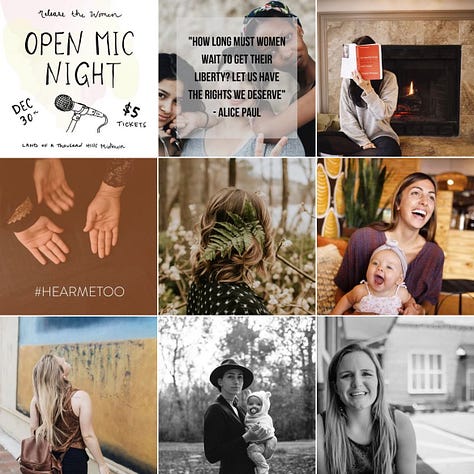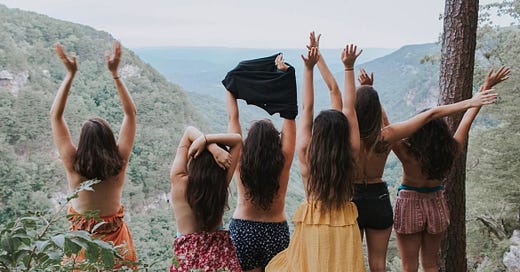Back in 2014, I was a Christian missionary living in Eastern Europe. At 23 years old, I was feeling the immense loneliness (and marginalization) of being an unmarried young woman within Evangelical ministry. The rumblings of my deconstruction had begun and when I set foot on the ‘mission field’, I realized that I didn’t quite believe in hell, and I certainly didn’t think I had any business telling people they were going there.
Some close friends and I had begun having conversations about feminism (gasp!) and what its place was within our faith. It felt radical and taboo, but we became committed to it — to telling our stories and speaking up about our experiences within the evangelical church. This stemmed from a number of things going on in our personal lives, in particular, the we were being marginalized within the Evangelical church and the mistreatment many of were experiencing from the Christian men in our communities.
The reality is, all of us had been violated in one way another through sexual assault, harassment, emotional abuse, and all of it was part of a deep undercurrent of misogyny that went unnamed and unchecked within our Christian circles.
Let me set the scene.
In the very popular, hip Atlanta church I attended in my early 20s, ‘house church’ was a big thing. Essentially it was small community groups of 10 to 15 people who would gather together once a week or so and read the Bible, pray, and sing worship music. We’d also do other things together like weekend trips to the mountains, parties, nights out, and other regular things groups of friends would do. This is all seemingly pretty innocuous, except when you factor in the part about it being a ‘house church’. Meaning there was a leader or leaders and it was connected to the larger church ministry who had certain expectations for what this looked like. Which meant two things: 1. Everything was talked about through a filter of spirituality and 2. the boys were in charge.
These boys were mostly nice, normal 20-something-year-old boys. But nice, normal 20-something-year-old boys shouldn’t be in charge of anything, least of all someone’s spiritual life.
Not only that, but within the context of evangelical purity culture, we were all sex-starved and desperate to get married as soon as humanly possible. And who better to marry than the cute(enough) boy who leads prayer on Thursday nights. I have many peers who married these boys. I hope it’s worked out for them.
For the rest of us who didn’t lock someone down in college, we were easy prey. These church boys could have their pick, and they did. We were kissed, touched, strung along, prayed for, violated. I remember having my ass grabbed by one of the guys who I considered a good friend. We were at a party and he was drunk. For a moment I felt lucky. Later, I cried.
It was from all this that I fled when I moved to Europe as a young missionary. I was tired of being on the outside of a boys club whose admittance fee was higher than I was willing to pay — or maybe I’m just saying that to protect my young-self’s pride, because really it’s just that none of them wanted to marry me.
I thought that if I became a missionary, I would finally be taken seriously, but actually it just meant that everyone forgot about me. I realized this quickly, and it was from this place — a place of wanting desperately to be respected and seen — that Release the Women was born.



The name was an idea from my friend (and co-founder Crystal), who, ironically, heard this phrase yelled from the pulpit by the head pastor1 of the hip Atlanta church we all went to. He was doing a series on women and how they are badass boss babes, or something like that. It was very radical at the time. He thought that women should be allowed to preach and this was a very hot thing to say. He was on stage yelling “release the women!” and everyone could not even believe how controversial he was being. Crystal and I discussed this later, and we decided we wanted to create a space where women could have the chance to have their voice heard and be taken seriously for who they were as people within the context of our faith.
It was these conversations and stories that became the fuel to my deconstruction. Together, we were able to give names to our experiences, to notice patterns of abuse, and to band together and say “this is not okay.” We gave each other permission to feel hurt and wronged. We affirmed each other and recognized the truth in one another’s stories. We said, “I believe you.”
A lot has changed since then. So much of who I was — and what Release the Women was — is completely unrecognizable now. We’ve all left the faith and our lives are nothing like they were then. We’ve grown and healed and moved on. I’ve turned this space into more of a dumping grown for my thoughts on post-christianity, motherhood, sexuality, feminism. You won’t find any Bible verses here.
But the name still remains. I briefly thought about changing it2, but I keep it because to me it represents the essence of deconstruction. That we really were those people. I was that person I’ve described, even if I don’t really know her now. I believed those things — I was hurt and I did the hurting. And also, there are things from that time that I still carry with me today. Good and bad. Things that shaped me into who I am. Words and phrases and verses and sermons that formed parts of my identity in ways I am grateful for.
Even when those words were shouted from a pulpit by someone who harmed us. So what if it was some dipshit pastor shouting “release the women” from a pulpit. All he did was string three words together. We were the ones that broke down the doors.
This pastor was misogynist in chief. He talked a big game and he loved to appear progressive on issues around women, LGBTQ people, and people of color, but there are so so so SO many of us that were harmed, abused, and mistreated under his leadership. He’s now a life coach and hosts a podcast with a few other white, male, 40-something-year-old former pastors. Bleak.
In large part for inclusivity reasons, but, in case it wasn’t clear, when I say women not only do I mean all women (including trans women), but I also mean it to represent anyone who has been marginalized and hurt by the racist, heteropatriarchal, capitalist society we live in.






